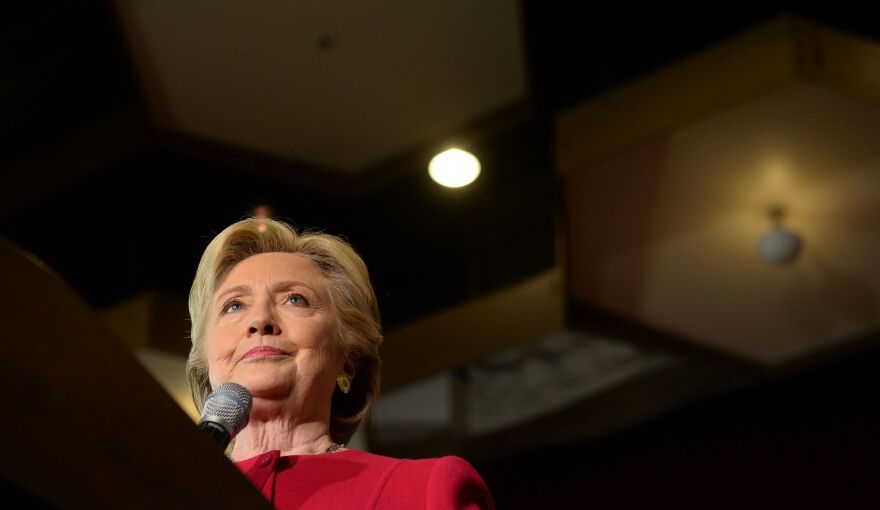Hillary Clinton's campaign has been dealing with the fallout from her choice to use a private email server while secretary of state since before there was even officially a campaign. Now, WikiLeaks has released private emails from March 2015 between Clinton advisers talking about how to handle the email mess.
Clinton's campaign says the email release is part of a Russian effort to interfere with the U.S. election. The campaign has chosen not to verify the authenticity of the emails hacked from the personal Gmail account of Clinton's campaign chairman, John Podesta.
In one chain, Podesta and Neera Tanden, a longtime Clinton ally, complain about the email story coming out so late in the game. Podesta writes that those in Clinton's inner circle "sure weren't forthcoming on the facts here."
Tanden asks, "Why didn't they get this stuff out like 18 months ago? So crazy," and in a later email answers her own question saying, "they wanted to get away with it."
'We Need To Clean This Up'
But of course, they didn't get away with it, and by the day, the story seemed to get worse for Clinton. Initially the New York Times reported she had only used a private email address, rather than a government account, while secretary of state. (Former Secretary of State Colin Powell later said he had done the same while in office).
Soon after that, The Associated Press broke the story that Clinton had gone beyond that, taking the unprecedented step of using a private email server. And that's around the time President Obama sat down for an interview with Bill Plante of CBS News.
When Plante asked Obama when he learned that Clinton had used a private "email system" for official business while she was secretary of state, Obama answered, "The same time everybody else learned it through news reports."
That prompted another email chain within Clinton's shadow campaign, with lawyer and aide Cheryl Mills weighing in to say, "we need to clean this up — he has emails from her — they do not say state.gov."
Two days later, on March 9, White House Press Secretary Josh Earnest did venture to clean it up in the daily press briefing.
"The point that the president was making is not that he didn't know Secretary Clinton's email address — he did — but he was not aware of the details of how that email address and that server had been set up or how Secretary Clinton and her team were planning to comply with the Federal Records Act," Earnest said.
Clinton's close aides knew they had a problem on their hands. In one email released by WikiLeaks, her longtime spokesman Philippe Reines responds to the suggestion that Clinton needs to get out there and explain the email arrangement herself because her critics were doing it for her by saying, "There Is Just No Good Answer We need to gut through the process phase, get them all out there and let the content do the talking."
He was referring to the State Department's planned public release of the work-related emails, which dribbled out over the course of many months. Ultimately, Clinton and her team did decide she needed to talk publicly about her email arrangement.
'I Opted For Convenience'
It was March 10, a full month before Clinton would announce she was running for president. But there she was, facing a wall of reporters with questions about her emails.
"I opted for convenience to use my personal email account, which was allowed by the State Department, because I thought it would be easier to carry just one device for my work and for my personal emails instead of two," Clinton said. "Looking back, it would have been better if I had simply used a second email account and carried a second phone. But at the time, this didn't seem like an issue."
And to this day, it continues to be an issue dogging her campaign. There was an FBI investigation that contradicted some of her initial explanations. That investigation ended in a decision not to press charges.
A New Weapon For Trump
Now, the WikiLeaks release is giving new ammunition to her opponent, Donald Trump, who talked about one of these email chains at a rally Tuesday in Florida.
It strains the imagination to think that the Russians could not or would not have information on Donald Trump. Yet all we're seeing through this weaponizing of WikiLeaks is information that's designed to hurt Hillary Clinton's campaign.
"Mills was saying Obama, he had to know that Hillary was using an illegal server," Trump said, "but he claimed otherwise, so that means Obama is now into the act."
With those remarks, Trump went much further than what the email chain actually said.
Clinton campaign Senior National Spokesman Glen Caplin says the campaign won't weigh in on the content or authenticity of any individual emails released by WikiLeaks, something the campaign and intelligence experts have blamed on Russia.
"It strains the imagination to think that the Russians could not or would not have information on Donald Trump," Caplin said. "Yet all we're seeing through this weaponizing of WikiLeaks is information that's designed to hurt Hillary Clinton's campaign."
And the slow drip of these internal emails, he says, is all part of that effort.
Copyright 2021 NPR. To see more, visit https://www.npr.org.



